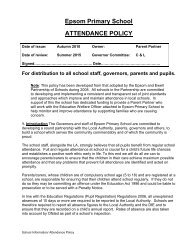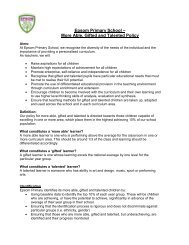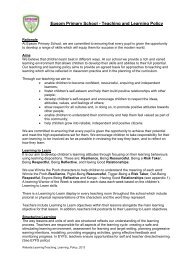Behaviour Policy - Epsom Primary School
Behaviour Policy - Epsom Primary School
Behaviour Policy - Epsom Primary School
Create successful ePaper yourself
Turn your PDF publications into a flip-book with our unique Google optimized e-Paper software.
ehaviour is likely to erupt, the mentor’s support might be requested to help talk tothe child and pre-empt any further difficulties. The mentor should not be expectedto apply any sanctions as this would alienate the child from them.o Providing responsibilities – some children in this category will benefit from beingplaced in a position of responsibility either in relation to a task or a peer. Helpingyounger children with a task, an adult or being given set routines at ‘trigger’ timescan increase their self-esteem and bring out the best in them. These should beconsidered as options.It is worth remembering that for some of these children:o friendships and relationships are crucial. They may develop a particular rapportwith any member of the school community – this should be built into the support forthe child.o a chaotic home life is experienced. Their behaviour in school might be directlylinked to events at home and awareness of these issues (whilst acknowledgingconfidentiality) can help those supporting them to understand where their actionsmight originate from.o find it difficult to be praised. For some children praise is not part of their normalexpectation and as such they can find it almost a threat. This might be seen wherea child is close to obtaining a major reward only to ‘fail’ at the last moment. Quicklyadministered incentives very closely linked to desired behaviour should beconsidered. It might also be appropriate to ‘freeze’ rather than remove rewards.This can help remove the ‘self-fulfilling prophecy’ of constant failure.o actions are not easily linked with consequence – their pattern behaviour may beso entrenched that they continue to repeat it even though they dislike the resultingconsequence.o feeling ‘cornered’ will result in extreme reactionsThere are no quick fixes and time and patience are needed. This can be draining on thestaff most directly in contact with children with BESD. They should also be givencounselling as appropriate and provided with the opportunity to vent their frustrations.Dealing with children with BESD is always a balance between:o the needs and inclusion of the individual child concernedo the entitlement of the classo the capacity of the teacher to remain calm in what can be extremely testingcircumstances.Where a child is ‘acting out’ a no-blame approach should be taken. Adults involved withthe child can take extremes of behaviour as a personal attack. This is rarely the case.Often the child will retain little of the actual events leading up to the behaviour or thebehaviour itself. They may not be able to explain themselves why they behaved as theydid and can just as suddenly revert to the normal behaviour expected of them.In cases such as this, opportunity for the child to ‘fit back in’ should be provided whilst alsoacknowledging that follow-up action may need to be taken but when circumstances aremore settled and the child can be encouraged to reflect on their behaviour. Every attemptshould be made to avoid escalation of problems through direct confrontation or ‘backingchildren into a corner’.<strong>School</strong> Inofrmation/Policies/<strong>Behaviour</strong> <strong>Policy</strong>8











